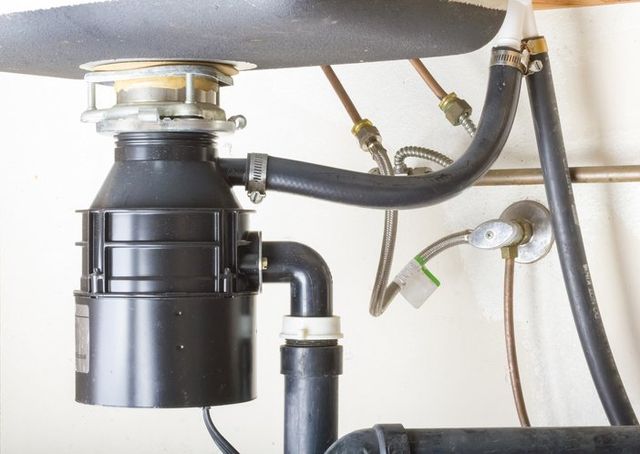Step by Step Techniques for Repairing a Leaky Garbage Disposal
Step by Step Techniques for Repairing a Leaky Garbage Disposal
Blog Article
Just how do you really feel when it comes to How to fix a pretty consistent leak from my garbage disposal?

Garbage disposals are necessary kitchen area devices that aid in getting rid of food waste efficiently. However, a dripping garbage disposal can be an irritating and unpleasant issue to deal with. The good news is, many leaks can be taken care of conveniently with a couple of simple steps. In this article, we will discuss how to fix a leaking waste disposal unit effectively.
Intro
Waste disposal unit are set up under kitchen area sinks and are developed to shred food waste into smaller sized pieces, allowing it to travel through the pipes system easily. While these tools are normally reputable, leaks can take place in time due to deterioration, loose links, or damage to the system.
Usual Root Causes Of Leakages in Trash Disposals
Worn Seals and Gaskets
Seals and gaskets play an essential role in avoiding water from leaking out of the waste disposal unit. With time, these parts can deteriorate, leading to leakages around the disposal system.
Loose Connections
The connections in between the waste disposal unit and the pipes system can end up being loose with time, triggering water to leak out throughout operation.
Cracks or Openings in the Disposal System
Physical damages to the waste disposal unit, such as cracks or openings in the real estate, can also cause leakages.
Recognizing the Source of the Leak
Prior to trying to deal with a leaking garbage disposal, it is important to identify the source of the leakage. This can typically be done through aesthetic assessment or by carrying out simple examinations.
Visual Evaluation
Inspect the waste disposal unit unit meticulously for any type of signs of water leakage. Pay close attention to areas around seals, gaskets, and link points.
Examining for Leaks
One means to evaluate for leakages is by running water with the disposal unit and checking for any type of noticeable indications of leak.
Tools and Products Needed for Fixing a Leaking Garbage Disposal
Prior to beginning the repair work process, collect the essential devices and products, including a screwdriver, adjustable wrench, plumbing's putty, substitute seals or gaskets, and epoxy or patching product for fixing cracks or openings.
Step-by-Step Overview to Repairing a Leaking Waste Disposal Unit
Shut off the Power
Before trying any fixings, make sure that the power to the garbage disposal device is turned off to stop the risk of electrical shock.
Locate the Leakage
Identify the precise location of the leakage and identify the reason.
Tighten up Connections
Make use of a wrench to tighten up any kind of loose links between the disposal unit and the plumbing system.
Replace Seals or Gaskets
If the leakage results from used seals or gaskets, eliminate the old elements and change them with new ones.
Patching Cracks or Openings
For fractures or holes in the disposal unit, usage epoxy or an ideal patching material to secure the broken area.
Examining the Waste Disposal Unit After Repair Service
Once the repair service is total, check the waste disposal unit by running water with it to make sure that the leak has been dealt with.
Preventive Maintenance Tips to Avoid Future Leakages
To avoid future leaks, it is essential to perform normal upkeep on your garbage disposal. This includes maintaining it tidy, avoiding putting non-food things or tough objects down the disposal, and occasionally looking for leaks or various other problems.
Conclusion
Finally, taking care of a leaking waste disposal unit is a reasonably simple procedure that can be completed with standard tools and products. By following the actions outlined in this post and exercising precautionary upkeep, you can keep your garbage disposal in good working problem and avoid expensive fixings in the future.
What to Do About a Leaking Garbage Disposal
A leaking garbage disposal often goes unnoticed until you confront a sopping cabinet, a foul-smelling puddle, or an audible drip-drip-drip from the unit. The fix can be frustrating, too, because the leak can stem from a number of components in the system. Fortunately, with a little sleuthing, you can zero in on the leak and—depending on the exact location—stop the icky oozing and repair the component that caused it. Worst case scenario, if it turns out that the garbage disposal must be replaced, installing a new one is a reasonable do-it-yourself task for those with basic plumbing skills. Read on to keep the cash you’d otherwise hand over to a pro.
Prepare to find the leak
Prior to testing the garbage disposal for leaks, unplug it at the wall outlet and turn off the power from the breaker box to prevent electrical shock. Then insert a watertight sink stopper into your sink drain and wipe the unit dry with a clean cloth. In any handy container, mix a few drops of food coloring into a few cups of water, and pour the dyed water onto the sink stopper to help you locate the leak.
Investigate the source
the top, where the disposal meets the sink drain the side, where the dishwasher hose or main drain pipe connects to the disposal or the bottom of the unit Inspect each of these locations while gliding a light-colored rag over the unit; the dyed water will readily show on the rag and reveal the location of the leak. If a leak isn’t immediately apparent, remove the sink stopper and pour a few more cups of dyed water down the sink drain, then check for leaks again. Leaks near the top of the unit are more likely to show themselves while the sink is plugged, while side and bottom leaks are more noticeable while the sink is unplugged.
The metal sink flange that sits directly inside the sink drain is typically sealed around the top with plumber’s putty (a clay-like sealant) and then secured from under the sink with bolts. If the plumber’s putty deteriorates, or the bolts loosen, the flange can no longer form a watertight seal between the sink drain and the disposal—which could cause a leak at the top of the unit.
To reseal the leaky flange, you must first detach the garbage disposal. Start by loosening the screws securing the main drain pipe to the disposal, then loosen the screws in the metal clamp securing the dishwasher hose to the disposal and detach the drain pipe and dishwasher hose from the disposal. Loosen the screws in the mounting ring that connects the disposal to the metal mounting assembly beneath the sink, then pull down the disposal and carefully set it on a clean, dry surface. Loosen the bolts in the mounting assembly with a wrench, then pull down the mounting assembly and set it near the disposal.

As a fervent person who reads about The Handy Guide To Fixing Your Garbage Disposal Leaking, I assumed sharing that excerpt was really useful. Enjoyed our review? Please share it. Let another person discover it. Thanks for going through it.
Article Report this page